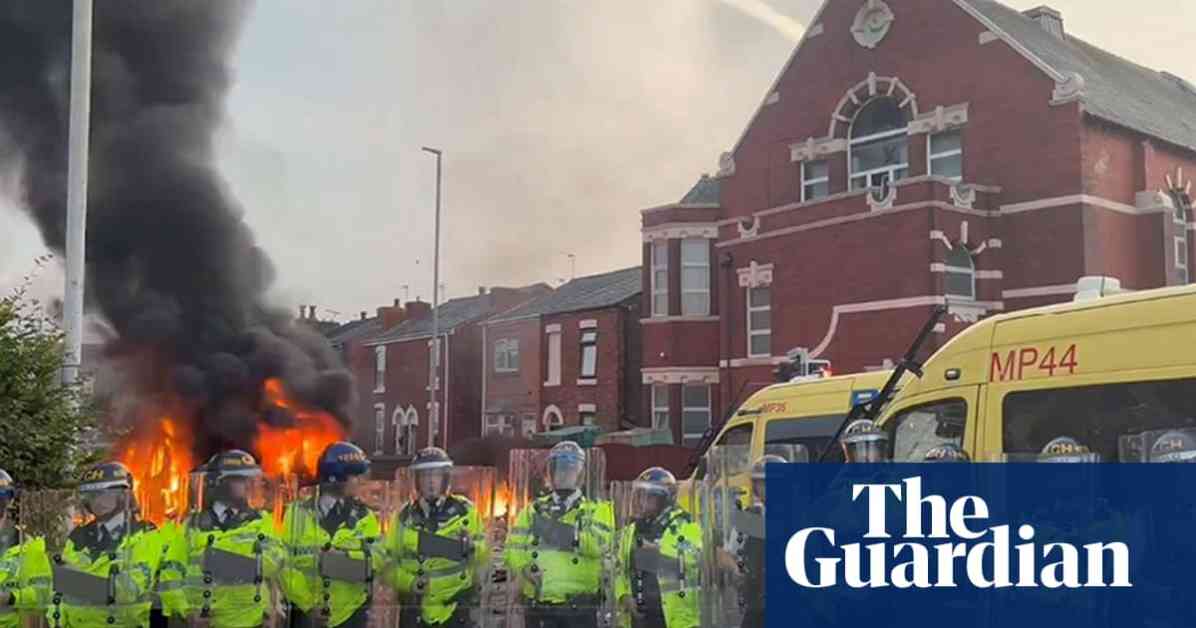A 12-year-old boy in England has become the youngest person to face legal consequences in connection with the riots that swept through UK cities earlier this summer. The boy, whose identity is protected due to his age, appeared at Liverpool youth court where he was given a 12-month referral order. Additionally, he was placed on a three-month curfew from 9pm to 7am, while his father received a six-month parenting order and was required to pay £200 in compensation to a mosque that was at the center of the disorder.
The incident that led to the boy’s charges occurred in Southport after a knife attack that resulted in the deaths of three girls. Caught on CCTV, the boy was seen throwing an object at police officers before fleeing on a bicycle. Despite not causing any injuries, Judge Wendy Lloyd emphasized that his actions were wrong and that he should have known better than to join an “angry group of people.”
Chief Constable Serena Kennedy of Merseyside police described the level of aggression directed at officers during the riots as unprecedented and horrifying. The violence left one police officer injured and a mosque leader trapped inside with worshippers as the building was targeted by a mob. The leader described the experience as being akin to “being under attack in a war” and expressed fear of both physical harm and smoke inhalation from fires deliberately started during the chaos.
The boy ultimately turned himself in to police after his mother recognized him in images circulated by authorities seeking information on those involved in the riots. Despite showing remorse and having no prior convictions, the boy’s actions were deemed unacceptable by the court. Heather Toohey, the defense attorney, highlighted the boy’s lack of intent to cause trouble and his willingness to take responsibility for his actions.
In sentencing, Judge Lloyd acknowledged the boy’s troubled past and expressed concern over his issues with alcohol at such a young age. She emphasized the severity of the situation and the impact of his participation in the violence. The boy’s case is notable for being one of the youngest in England to face legal repercussions for involvement in the riots.
The Impact of Youth Involvement in Riots
The involvement of a 12-year-old boy in the UK riots raises questions about the impact of youth participation in such events. While adults may claim to have been caught up in the moment, the case of the young boy underscores the need for accountability regardless of age. The consequences of his actions not only affected the community but also highlighted the challenges faced by young individuals who may be influenced by their surroundings.
Youth involvement in riots can have long-lasting effects on both individuals and communities. The psychological trauma experienced by those caught up in the violence, as well as the physical damage to property and infrastructure, underscores the importance of addressing the root causes of such behavior. It is essential to provide support and guidance to young people to prevent them from becoming entangled in acts of violence and disorder.
Addressing Underlying Issues
In the case of the 12-year-old boy, his troubled past and issues with alcohol raise concerns about the support and resources available to young individuals facing challenges. It is crucial to address underlying issues such as substance abuse, mental health, and family dynamics to prevent further involvement in criminal activities. Early intervention and targeted interventions can help steer young people away from negative influences and towards positive pathways.
The role of parents and guardians in shaping the behavior of young individuals cannot be understated. The parenting order issued to the boy’s father highlights the importance of parental responsibility in guiding and supporting children, especially during challenging times. By providing a stable and nurturing environment, parents can help prevent their children from engaging in harmful behaviors and promote positive development.
Educational and Preventative Measures
In addition to individual support, educational and preventative measures play a crucial role in addressing youth involvement in riots. Schools, community organizations, and government agencies can work together to provide education on conflict resolution, social responsibility, and the consequences of violence. By instilling values of empathy, respect, and cooperation, young people can develop the skills needed to navigate challenging situations without resorting to destructive behavior.
Preventative measures such as community outreach programs, youth engagement initiatives, and mental health support services can help identify and address risk factors that may lead to involvement in criminal activities. By promoting positive relationships, fostering a sense of belonging, and offering resources for at-risk youth, communities can create a supportive environment that empowers young individuals to make healthy choices and avoid harmful behaviors.
In conclusion, the case of the 12-year-old boy sentenced in connection with the UK riots highlights the complex issues surrounding youth involvement in criminal activities. By addressing underlying challenges, providing support and guidance, and implementing educational and preventative measures, communities can help prevent young people from becoming entangled in acts of violence and disorder. It is essential to prioritize the well-being and development of young individuals to create a safe and inclusive society for all.












